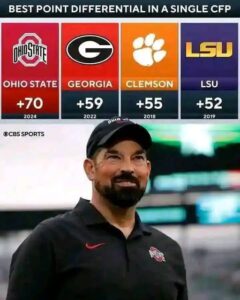
In a surprising turn of events, LSU football’s defensive line depth took an unexpected hit when four-star signee Dilan Battle entered the NCAA transfer portal before ever stepping onto the field in Baton Rouge. The 6-foot-4, 290-pound defensive tackle from Louisiana was a highly anticipated addition to the Tigers’ 2025 recruiting class, but his sudden departure has left fans and analysts alike questioning the factors that led to this decision.
The Rise of Dilan Battle
Dilan Battle’s recruitment was a significant storyline for LSU. As a four-star prospect, he was ranked among the top defensive tackles in the nation. His commitment to LSU was seen as a major win for head coach Brian Kelly and his staff, bolstering the Tigers’ defensive line for the upcoming seasons. Battle’s blend of size, strength, and agility made him a promising candidate to contribute immediately upon arrival.
The Unexpected Decision
Despite the high expectations, Battle’s tenure at LSU was brief. Before participating in any practices or games, he entered the transfer portal, signaling his intent to leave the program. This move was particularly surprising given the limited information available about any potential issues or dissatisfaction on Battle’s part.
The timing of the decision raised further questions. With the 2025 season approaching and LSU’s defensive line in need of reinforcements, Battle’s departure left a noticeable gap. The Tigers had already experienced several other departures from their defensive line, including Jay’Viar Suggs, who transferred to Wisconsin , and Kimo Makane’ole, who entered the portal after moving from the offensive line . These losses compounded the challenges facing LSU’s defensive front.
Possible Factors Behind the Transfer
While the exact reasons for Battle’s decision remain unclear, several factors could have influenced his choice:
- Depth Chart Competition: LSU’s defensive line was becoming increasingly competitive, with the emergence of players like Dominick McKinley and Ahmad Breaux. The addition of veteran Jacobian Guillory further intensified the competition for playing time. Battle may have assessed his prospects for immediate playing time and decided to seek opportunities elsewhere.
- Coaching Changes: Changes in coaching staff or defensive schemes can impact a player’s fit within a program. If Battle felt that the defensive system at LSU no longer aligned with his strengths or development goals, he might have considered transferring as a viable option.
- Personal Reasons: Personal circumstances, such as family considerations or a desire to be closer to home, can play a significant role in a player’s decision to transfer. While not publicly disclosed, such factors are often influential in these situations.
Impact on LSU’s Defensive Line
Battle’s departure adds to the challenges LSU faces in rebuilding its defensive line. The Tigers had already lost several key players to the transfer portal, and Battle’s exit leaves another void to fill. However, LSU’s coaching staff has been proactive in addressing these gaps by securing commitments from other talented recruits and transfers. The addition of players like Sydir Mitchell from Texas and the development of young talents such as McKinley and Breaux provide hope for the future.
Looking Ahead
While Battle’s unexpected departure is a setback, it also presents an opportunity for other players to step up and make their mark on LSU’s defensive line. The Tigers’ coaching staff will need to continue to adapt and recruit effectively to ensure the defensive front remains a strength. As the 2025 season approaches, all eyes will be on how LSU responds to these challenges and whether they can maintain their competitive edge in the SEC.
In conclusion, Dilan Battle’s decision to enter the transfer portal before playing a game for LSU has raised eyebrows and sparked discussions about the factors influencing player movement in college football. While the specific reasons for his departure remain undisclosed, the situation underscores the complexities of college athletics and the ever-changing dynamics of team rosters. LSU’s ability to navigate these challenges will be crucial as they aim to remain a formidable force in college football.





